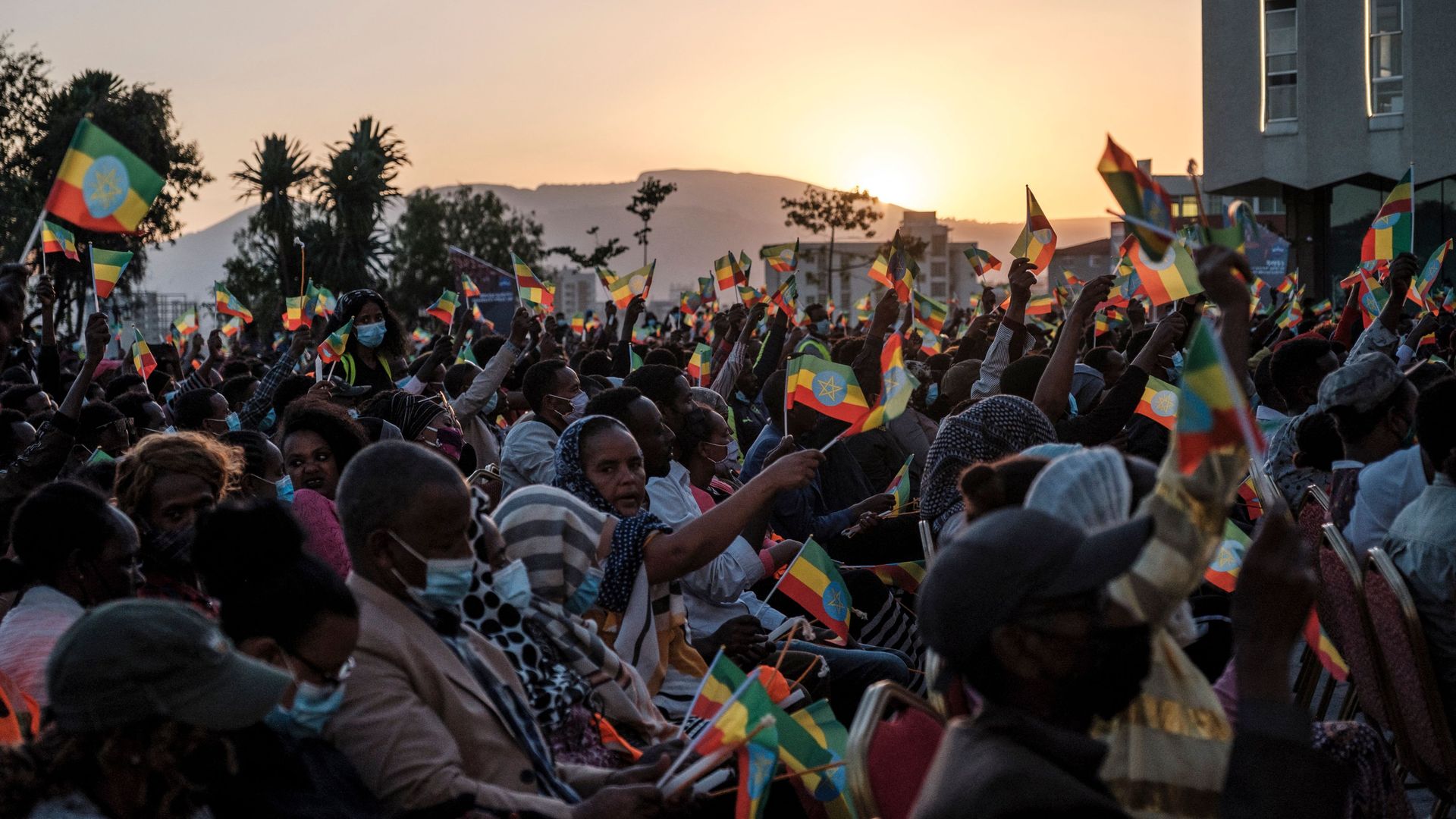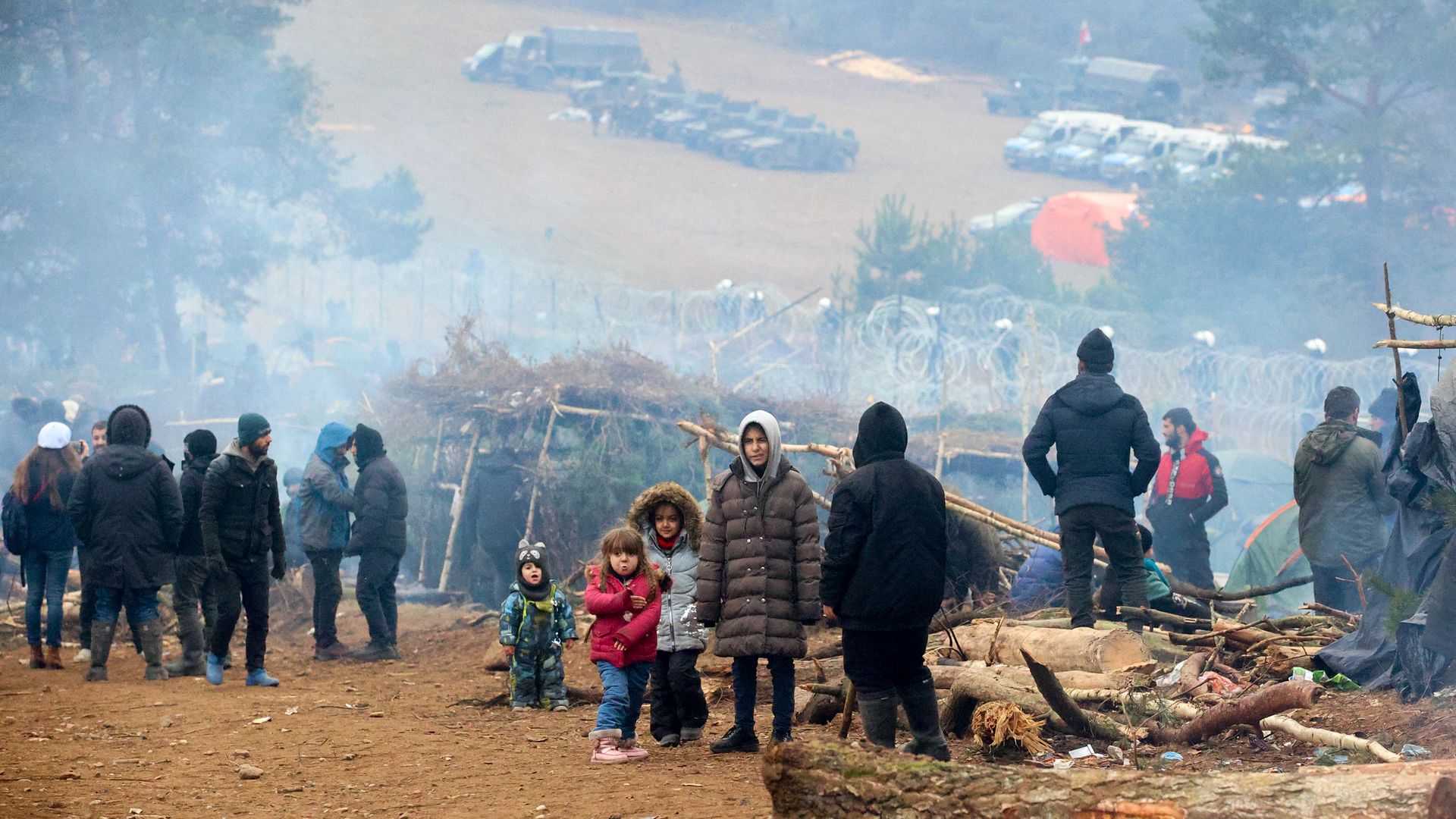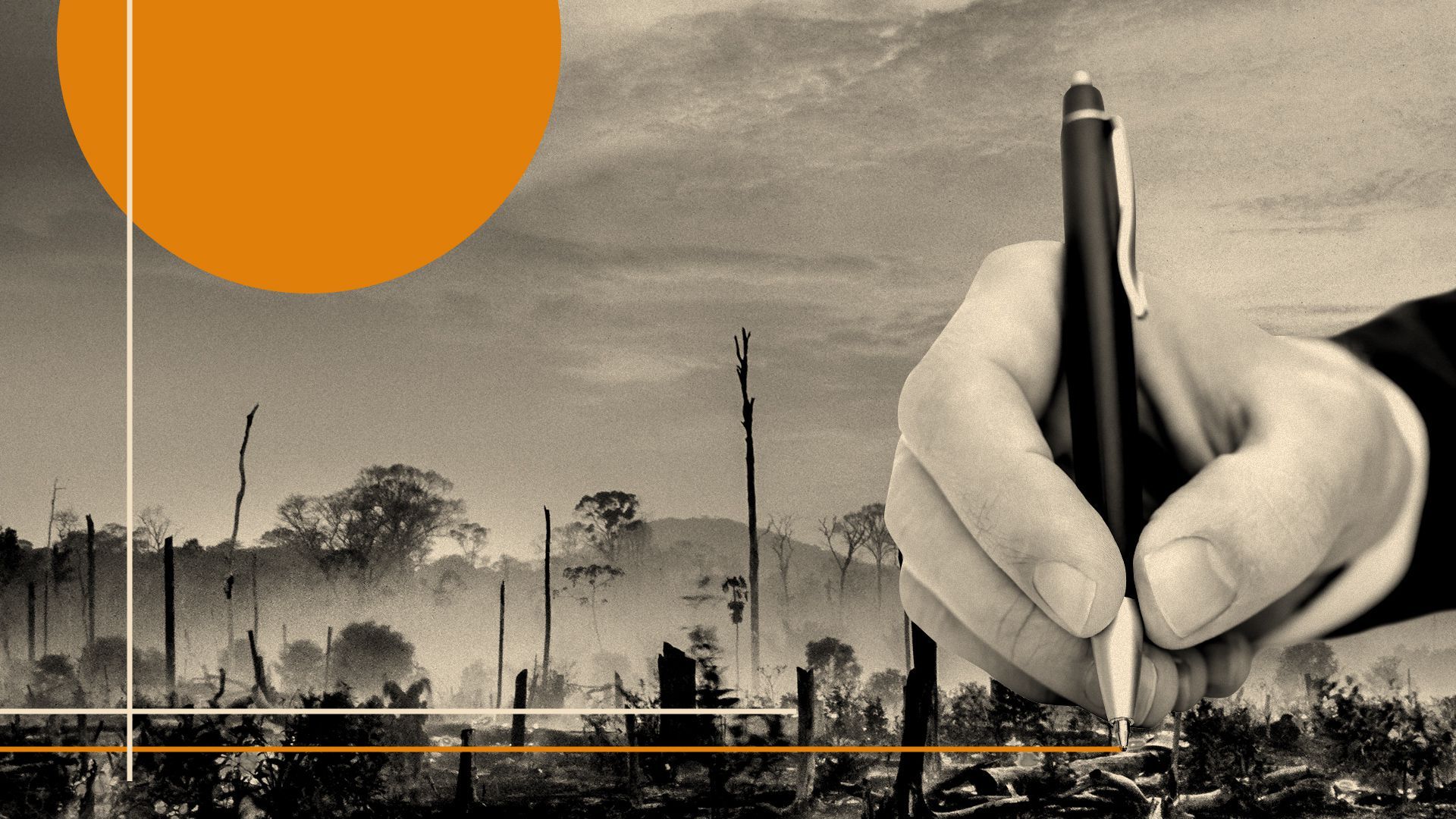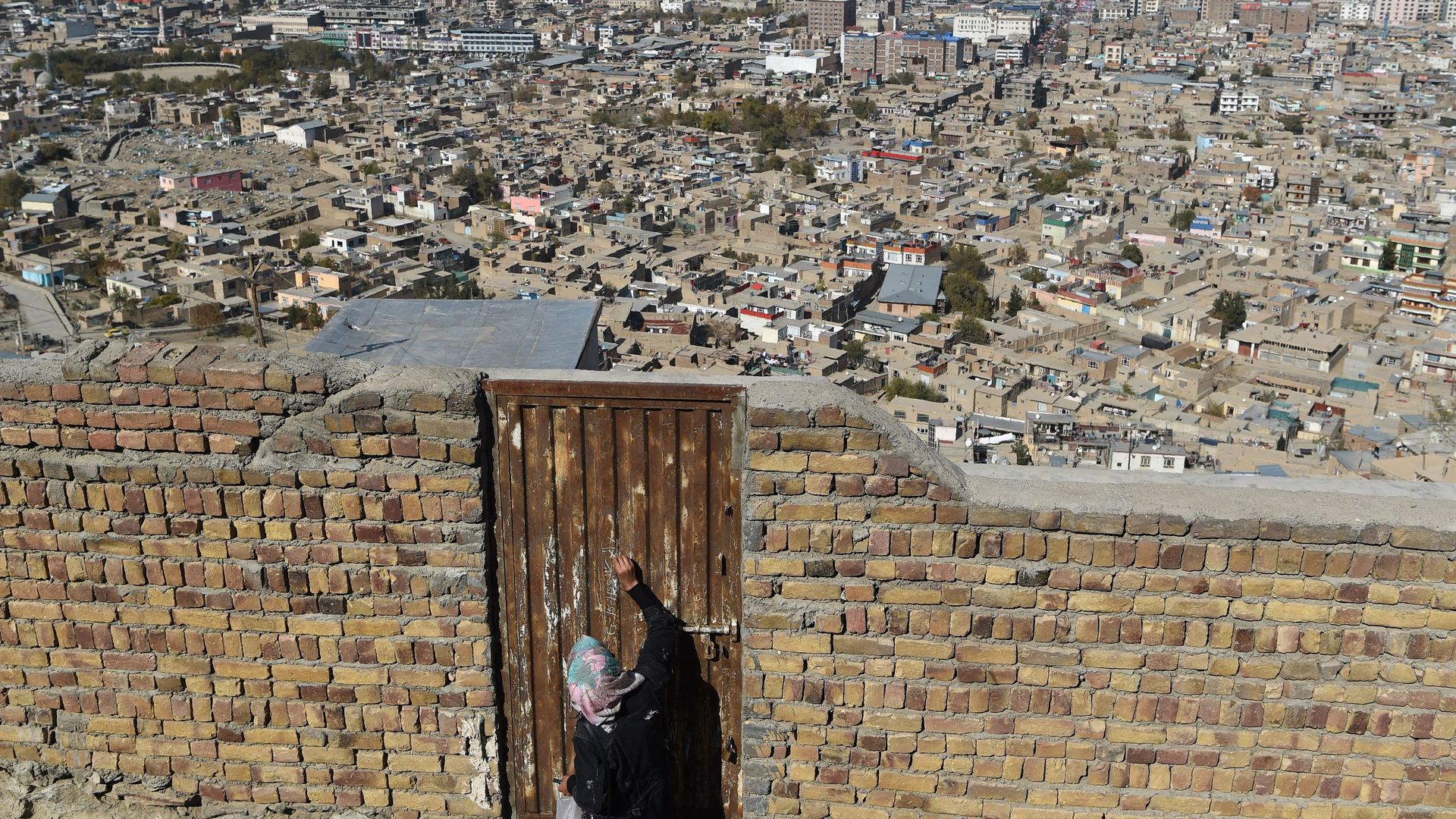| |
| |
| |
| Presented By MethaneSAT |
| |
| Axios World |
| By Dave Lawler ·Nov 15, 2021 |
| Welcome back to Axios World. - I'm back from my travels to Scotland and Appalachia. If you ever get a chance to drive the Blue Ridge Parkway in the fall, do it.
- Tonight's edition (1,687 words, 6 minutes) takes off from Addis Ababa.
🚨 Situational awareness: President Biden's virtual meeting with Xi Jinping is set to begin shortly. |
| |
| |
| 1 big thing: Now or never for Ethiopia evacuations |
 |
|
| A memorial service in Addis Ababa for victims of the war. Photo: Eduardo Soteras/AFP via Getty |
| |
| The Biden administration is warning Americans in Ethiopia to evacuate immediately or they could be trapped if the civil war spreads to the capital. What they're saying: State Department spokesperson Ned Price says U.S. passport holders should not expect a Kabul-style airlift if the fighting reaches Addis Ababa. That's not going to happen, Price told Axios, calling the Afghanistan withdrawal a "unique and extraordinary situation." - "Right now, Addis is calm, and it has been calm since the conflict started to spread," Price said. There are flights leaving daily with excess capacity, and financing is available through the U.S. Embassy for Americans who can't afford tickets, Price added.
- But there's a possibility the conflict could reach Addis Ababa and that commercial carriers wouldn't be able to get out, he said. There are a significant number of U.S. passport holders in the Ethiopian capital, most of whom are dual citizens.
State of play: One year after Prime Minister Abiy Ahmed launched an offensive to topple regional leaders in Tigray who had rebelled against the federal government, it's now the rebels who are advancing and the national capital that could come under threat. - The Tigray People's Liberation Front (TPLF) — which dominated Ethiopia's government before being pushed aside by Abiy in 2018 — has allied with the Oromo Liberation Army under the banner of ethnic self-determination, against Abiy's vision of a strong central state.
- The rebels claim to have pushed within 200 miles of Addis Ababa, and Abiy earlier this month declared a state of emergency and urged citizens to take up arms if necessary.
Driving the news: Secretary of State Tony Blinken warned Friday that a prolonged civil war "could lead to the implosion of Ethiopia and spill over into other countries in the region." - The U.S. has also accused Abiy's government of blocking aid to Tigray despite the risk of mass starvation.
- The breakdown of the fighting along ethnic lines, and the persistent reports of war crimes on all sides, have led to fears of a repeat of Rwanda — this time in Africa's second-largest country.
Blinken will fly overnight tonight to Kenya. He'll meet in Nairobi with President Uhuru Kenyatta, who just returned from Addis Ababa and has called for a halt to the fighting. - The ceasefire push is being led by African Union envoy Olusegun Obasanjo, a former Nigerian president.
- Currently, neither a ceasefire nor the fall of Addis Ababa appears imminent.
- In the longer term, it remains to be seen whether Abiy will retain power or whether the state itself can hold together, Nic Cheeseman and Yohannes Woldemariam write in Foreign Affairs.
Zoom out: During his trip, which will also include stops in Nigeria and Senegal, Blinken will give a speech laying out the administration's approach to Africa. |
    |
| |
| |
| 2. Belarus and Russia probe European borders |
 |
|
| Migrants at a camp on the Belarusian-Polish border. Photo: Leonid Shcheglov\TASS via Getty |
| |
| These are tense times in Eastern Europe. Driving the news: The EU's foreign policy chief today announced new sanctions on "people, airlines, travel agencies and everyone involved in this illegal push of migrants against our borders." - He was referring to the surge in people from Iraq, Syria and Yemen entering Belarus on tourist visas and then, allegedly, being channeled toward the border with Poland and the EU.
- Belarusian dictator Aleksandr Lukashenko has already promised to retaliate. He appears to have employed these tactics — described as "hybrid warfare" by officials in Washington and Brussels — in response to prior Western sanctions.
- Thousands of migrants are caught in the middle: blocked from entering Poland by barbed wire and border guards; reportedly forcibly blocked from turning back to Belarus by security forces; now facing sub-freezing temperatures.
- What's next: Poland, Latvia and Lithuania may invoke NATO's Article 4 to trigger alliance-wide consultations on protecting their territorial integrity.
Meanwhile, NATO Secretary-General Jens Stoltenberg today — standing alongside Ukraine's foreign minister — warned that the "large Russian military buildup" on Ukraine's borders must not lead to "aggressive actions" from Moscow. - Blinken has raised the prospect of Russia finding a pretext to invade Ukraine as it did in 2014.
- Between the lines: NATO, the U.S. and allies like France have been trying to send strong signals in recent days that they'll stand up for Ukraine's sovereignty, but no one expects that support to extend to military action.
|
    |
| |
| |
| 3. Cracking down on the unvaccinated |
 Reproduced from Our World in Data; Chart: Axios Visuals Facing record-high case counts and dwindling hospital capacity, Austria today introduced a new 10-day lockdown. The twist: It applies only to the 2 million Austrians over 12 who aren't vaccinated. Already barred from restaurants and many other businesses, they will now have to stay home except for work, grocery shopping or emergencies — or face a fine of up to €1,450 ($1,649). The big picture: Governments around the world are increasingly targeting their pandemic policies specifically at unvaccinated individuals, who are five times more likely to get infected and 10 times more likely to die from COVID-19, Axios' Shawna Chen writes. - The Singaporean government announced last Monday that it will stop covering medical bills for people who are "unvaccinated by choice" after Dec. 8.
- Businesses in New Zealand including hair salons, bars and gyms must ensure all staff members are vaccinated in order to operate under an upcoming order.
- In New South Wales, Australia, unvaccinated people over the age of 16 are no longer allowed to visit another person's residence, except in limited circumstances.
- Some German states have barred people who are eligible for vaccination but choose not to get it from indoor venues like restaurants and clubs.
What to watch: Cases are spiking all across Europe, and countries (including the Netherlands) are starting to lock back down. One question they'll face is whether to focus those measures specifically on the unvaccinated or on society as a whole. |
    |
| |
| |
| A message from MethaneSAT |
| We need to cut methane fast. Our first-of-its-kind satellite can help |
| |
 |
| |
| The U.S. joined over 100 countries in a pledge to slow global warming by cutting methane emissions 30% by 2030. MethaneSAT, a methane tracking satellite scheduled to launch in 2022, will help countries and companies meet this pledge to address the climate crisis. Learn more at MethaneSAT.org. |
| |
| |
| Bonus: Where in the world? |
 |
|
| Screengrab via Apple Maps |
| |
| Today we're visiting a city that is far larger (pop. 8.8 million) than I ever would have guessed. It's world famous for three large objects that are visible from space. Scroll to the bottom for the answer. |
    |
| |
| |
| 4. Global elections roundup |
 |
|
| Libyans protest the candidacy of Seif al-Islam Gadhafi. Photo: Hamza Alahmar/Anadolu Agency via Getty |
| |
| 1. Seif al-Islam Gadhafi, son of late Libyan dictator Moammar Gadhafi, emerged Sunday after a decade out of the public eye to register as a presidential candidate in the country's Dec. 24 election. - Between the lines: A debate is raging in Libya over whether a credible election can be held in the fragile state, particularly with Gadhafi and warlord Khalifa Haftar — who still largely controls eastern Libya — expected to be on the ballot.
2. Argentina's ruling leftist coalition was dealt a crushing blow in Sunday's midterm elections, losing control of the Senate for the first time since 1983. - The Peronists will now be forced to work with the center-right opposition to get anything through Congress and to strike a new debt repayments deal with the IMF.
3. Neither Philippines President Rodrigo Duterte nor his daughter Sara Duterte will be running for president in May, but they'll both still be on the ballots. - Sara is seeking the vice presidency, and she's been asked by Ferdinand "Bongbong" Marcos — son of the late dictator Ferdinand Marcos Sr. — to serve as his de facto running mate (presidents and vice presidents are elected separately).
- But Rodrigo, who filed today to run for Senate, said he would not support Marcos.
4. A brand new anti-corruption party narrowly won Bulgaria's parliamentary election on Sunday, the third election this year. - They'll now have the challenge of forming a government to break the prolonged political deadlock.
5. Chileans will go to the polls on Sunday with their outgoing president, Sebastián Piñera, facing an impeachment trial over Pandora Papers reports about his offshore financial dealings. - More on that election in Thursday's edition.
|
    |
| |
| |
| 5. What to make of COP26 |
 |
|
| Illustration: Aïda Amer/Axios |
| |
| In the end, the COP26 climate summit fell short of what was hoped, but it surpassed what was expected. One accomplishment was improving the COP plumbing to strengthen the ambition and transparency of summits to come. The final agreement calls for countries to come back in 2022 (rather than 2025) with stronger emissions-cutting pledges and to report detailed emissions data by 2024 to provide firmer benchmarks. - Rich countries also agreed to double their funding to help developing countries adapt to climate change by 2025, but they didn't agree to make back payments on climate finance shortfalls from past years.
- The agreement also falls far short of what vulnerable countries wanted in terms of compensation for "loss and damage" due to climate change, meaning that issue will rage on into COP27 in Egypt.
There was last-minute drama over the weekend as India and China forced the language on coal to be shifted from "phase out" to "phase down" — a dispute that underscores the fact that these negotiations take place in the realm of the hypothetical. - It also tells the story of climate diplomacy coming out of COP26: "down" but not "out."
Go deeper: Breaking down the deal |
    |
| |
| |
| 6. Portugal protects work/life balance in the WFH age |
 |
|
| Illustration: Aïda Amer/Axios |
| |
| Under a new law, employers in Portugal must: - Pay for additional internet and energy costs incurred by employees working from home.
- Arrange for remote workers to meet their colleagues in person at least every two months.
- Allow any workers with young children to work from home if they choose.
In a step that might sound particularly shocking to American readers, the law also bans employers from contacting staff members who are working from home outside of their contracted hours. Go deeper, via the NYT. |
    |
| |
| |
| 7. Stories we're watching |
 |
|
| A health worker marks the door of a home in Kabul after administering a polio vaccine. Photo: Wakil Kohsar/AFP via Getty |
| |
- U.S. journalist released from Myanmar prison
- Biden to host first North American Leaders' Summit since 2016
- Xi enshrined as "historical leader"
- U.S. will speed COVID vaccines to conflict zones
- U.S., allies condemn Sudan's new military-led council
- Qatar to represent U.S. interests in Taliban-led Afghanistan
- Global food waste keeps piling up
Quoted: "Is Turkey still a democratic government?" — Axios' Jonathan Swan to NATO Sec.-Gen. Jens Stoltenberg on "Axios on HBO," after Stoltenberg had stressed the need for prospective NATO member states to strengthen their democracies. After a pause... "They have elections. The opposition was able to win an election in Istanbul recently. But I think also it's fair to say that ... several allies have expressed concerns about Turkey." — Stoltenberg |
    |
| |
| |
| A message from MethaneSAT |
| We need to cut methane fast. Our first-of-its-kind satellite can help |
| |
 |
| |
| The U.S. joined over 100 countries in a pledge to slow global warming by cutting methane emissions 30% by 2030. MethaneSAT, a methane tracking satellite scheduled to launch in 2022, will help countries and companies meet this pledge to address the climate crisis. Learn more at MethaneSAT.org. |
| |
| Answer: Giza, Egypt. |
 | | It'll help you deliver employee communications more effectively. | | |
No comments:
Post a Comment